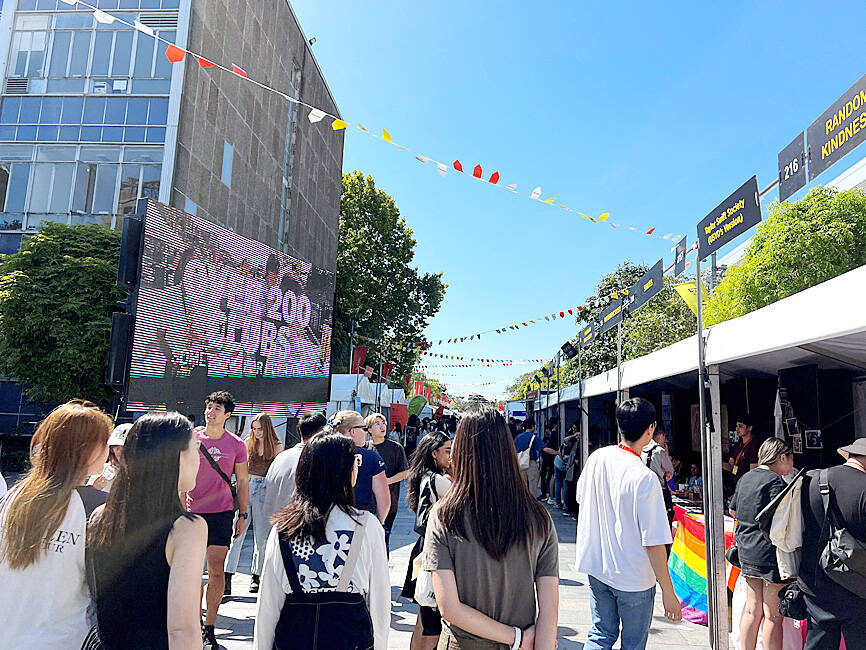Australia yesterday said that it would limit the enrollment number of new international students at 270,000 for next year, as the government looks to rein in record migration that has contributed to a spike in home rental prices.
The decision follows a raft of actions since last year to end COVID-19-era concessions for foreign students and workers in Australia that helped businesses recruit staff locally while strict border controls kept overseas workers out.
“There’s about 10 percent more international students in our universities today than before the pandemic, and about 50 percent more in our private vocational and training providers,” Australian Minister for Education Jason Clare told a news conference.

Photo: Reuters
New international student enrollments would be capped at 145,000 for universities, which is about last year’s levels, and 95,000 for practical and skills-based courses.
Universities Australia said the government move would “apply a handbrake” to the sector.
“We acknowledge the government’s right to control migration numbers, but this should not be done at the expense of any one sector, particularly one as economically important as education,” Universities Australia chair professor David Lloyd said in a statement.
International education, Australia’s fourth-biggest export after iron ore, gas and coal, brought A$36.4 billion (US$24.7 billion) to the economy in the 2022-2023 financial year, but polls have showed voters are concerned about large influxes of foreign students and workers putting excess pressure on the housing market, making immigration one of the potential major battlegrounds in an election less than an year away.
Net immigration hit a record high in the year to Sept. 30 last year, surging 60 percent to a record 548,800, mostly driven by students from India, China and the Philippines.
In a bid to contain the surge in migration, the government last month more than doubled the visa fee for foreign students.

When Shanghai-based designer Guo Qingshan posted a vacation photo on Valentine’s Day and captioned it “Puppy Mountain,” it became a sensation in China and even created a tourist destination. Guo had gone on a hike while visiting his hometown of Yichang in central China’s Hubei Province late last month. When reviewing the photographs, he saw something he had not noticed before: A mountain shaped like a dog’s head rested on the ground next to the Yangtze River, its snout perched at the water’s edge. “It was so magical and cute. I was so excited and happy when I discovered it,” Guo said.

TURNAROUND: The Liberal Party had trailed the Conservatives by a wide margin, but that was before Trump threatened to make Canada the US’ 51st state Canada’s ruling Liberals, who a few weeks ago looked certain to lose an election this year, are mounting a major comeback amid the threat of US tariffs and are tied with their rival Conservatives, according to three new polls. An Ipsos survey released late on Tuesday showed that the left-leaning Liberals have 38 percent public support and the official opposition center-right Conservatives have 36 percent. The Liberals have overturned a 26-point deficit in six weeks, and run advertisements comparing the Conservative leader to Trump. The Conservative strategy had long been to attack unpopular Canadian Prime Minister Justin Trudeau, but last month he

Chinese authorities said they began live-fire exercises in the Gulf of Tonkin on Monday, only days after Vietnam announced a new line marking what it considers its territory in the body of water between the nations. The Chinese Maritime Safety Administration said the exercises would be focused on the Beibu Gulf area, closer to the Chinese side of the Gulf of Tonkin, and would run until tomorrow evening. It gave no further details, but the drills follow an announcement last week by Vietnam establishing a baseline used to calculate the width of its territorial waters in the Gulf of Tonkin. State-run Vietnam News

PROBE: Last week, Romanian prosecutors launched a criminal investigation against presidential candidate Calin Georgescu accusing him of supporting fascist groups Tens of thousands of protesters gathered in Romania’s capital on Saturday in the latest anti-government demonstration by far-right groups after a top court canceled a presidential election in the EU country last year. Protesters converged in front of the government building in Bucharest, waving Romania’s tricolor flags and chanting slogans such as “down with the government” and “thieves.” Many expressed support for Calin Georgescu, who emerged as the frontrunner in December’s canceled election, and demanded they be resumed from the second round. George Simion, the leader of the far-right Alliance for the Unity of Romanians (AUR), which organized the protest,